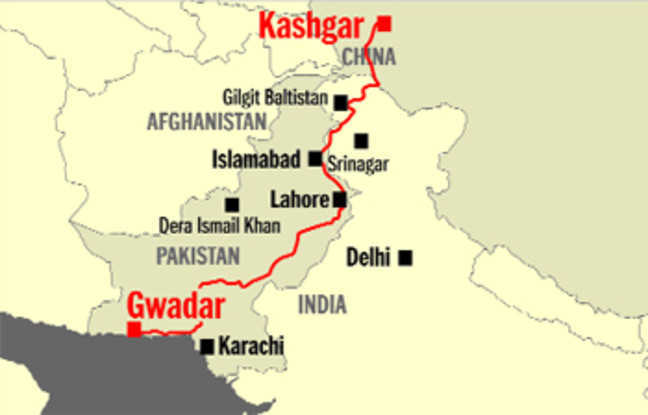
by Arnab Baidya 17 September 2023
Pakistan and China, often referred to as unwavering allies, have once again solidified their strategic partnership by officially signing six pivotal documents, symbolizing the commencement of the second phase of the China-Pakistan Economic Corridor (CPEC). This significant milestone aligns with the celebration of a decade of CPEC’s existence, an ambitious initiative that has left an indelible mark on regional connectivity and economic development. As the world observes the progression of this critical partnership, it is paramount to delve into the potential implications and promising future prospects that lie ahead.
CPEC, a visionary project initially launched in 2013, ingeniously connects Pakistan’s Gwadar Port with China’s Xinjiang province. It stands as a testament to the enduring friendship and cooperation shared between Pakistan and China. Despite facing opposition, notably from India, CPEC has continued to expand, making substantial contributions to Pakistan’s infrastructure development and overall economic growth. On a momentous occasion in late July, former Prime Minister Shehbaz Sharif of Pakistan and Chinese Vice Premier He Lifeng presided over the signing of six monumental documents, officially marking the commencement of the second phase of CPEC. This ceremony served as a profound reaffirmation of the enduring and unwavering strategic relations between these two nations. During this significant event, Vice Premier He conveyed President Xi Jinping’s unwavering support for Pakistan’s prosperity and development, underscoring the deep-rooted fraternal bonds shared between the two nations.
As a prominent member of the Politburo of the Central Committee of China’s ruling Communist Party, Vice Premier He reiterated China’s unparalleled and steadfast friendship with Pakistan. He emphasized China’s role as an “iron brother and strategic partner” and pledged continued economic and financial support for Pakistan. Furthermore, China expressed its readiness to enhance Pakistan’s agricultural and food exports, thereby fortifying economic collaboration.
Key Documents Shaping the Future: The signing ceremony featured six pivotal documents, each contributing to the expansion and consolidation of CPEC:
- Joint Cooperation Committee on CPEC: This document establishes the framework for bilateral collaboration on CPEC projects, underscoring the importance of cooperative efforts and progress monitoring.
- MoU on Establishing an Export Exchange Mechanism within CPEC: This memorandum of understanding focuses on facilitating trade and economic growth by streamlining exports through CPEC, promoting smoother trade channels.
- Protocol of Phytosanitary Requirements for the Export of Dry Chillies from Pakistan to China: This protocol enhances agricultural cooperation, ensuring the safe and efficient export of dry chillies to China, thus fostering agricultural ties.
- Document on the Final Report on the Feasibility Study of Realignment of KKH Phase-II: This report explores the feasibility of realigning the Karakoram Highway, a vital transportation route under CPEC, potentially unlocking new avenues for trade and connectivity.
- MoU on the Industrial Workers Exchange Programme: Promoting people-to-people ties, this memorandum of understanding facilitates the exchange of industrial workers between Pakistan and China, fostering cultural exchange and collaboration.
Prime Minister Shehbaz Sharif expressed his delight at the signing of these pivotal documents and conveyed his gratitude to Vice Premier He for commemorating the ten-year anniversary of CPEC. He acknowledged that CPEC’s first phase had attracted more than USD 25 billion in investments, primarily in sectors such as power, road infrastructure, hydropower, and public transport. Looking forward to the second phase, Prime Minister Sharif emphasized the significance of business-to-business investments in agriculture and information technology. This phase aims to enable Pakistan to meet Chinese standards and requirements for exports, thereby strengthening economic cooperation and diversifying trade.
Vice Premier He’s visit to Pakistan holds significant importance, given Pakistan’s challenges in meeting its foreign obligations. China played a pivotal role in assisting Pakistan by rolling over more than USD 5 billion in loans, underscoring the depth of their bilateral relationship. CPEC is an integral part of China’s ambitious Belt and Road Initiative (BRI), launched by President Xi Jinping in 2013. The BRI aims to connect Southeast Asia, Central Asia, the Gulf region, Africa, and Europe through an extensive network of land and sea routes, fostering economic development and connectivity. While praised as a transformative initiative, the BRI has also faced criticism due to concerns about smaller countries burdened by mounting Chinese debt.
The signing of these six crucial documents underscores the unwavering commitment of Pakistan and China to fortify their all-weather strategic partnership. As both nations celebrate a decade of CPEC, the project’s transformative impact on Pakistan’s economy and regional connectivity remains indisputable. The second phase, with its focus on agriculture, information technology, and exports, holds significant promise for further enhancing economic cooperation and paving the way for sustainable development. The enduring bond between Pakistan and China, often referred to as the “iron brotherhood,” remains steadfast, and their unique relationship will continue to flourish, promoting progress and prosperity for both nations. The world watches with keen interest as these two nations navigate the challenges and seize the opportunities that lie ahead in their collaborative journey.
